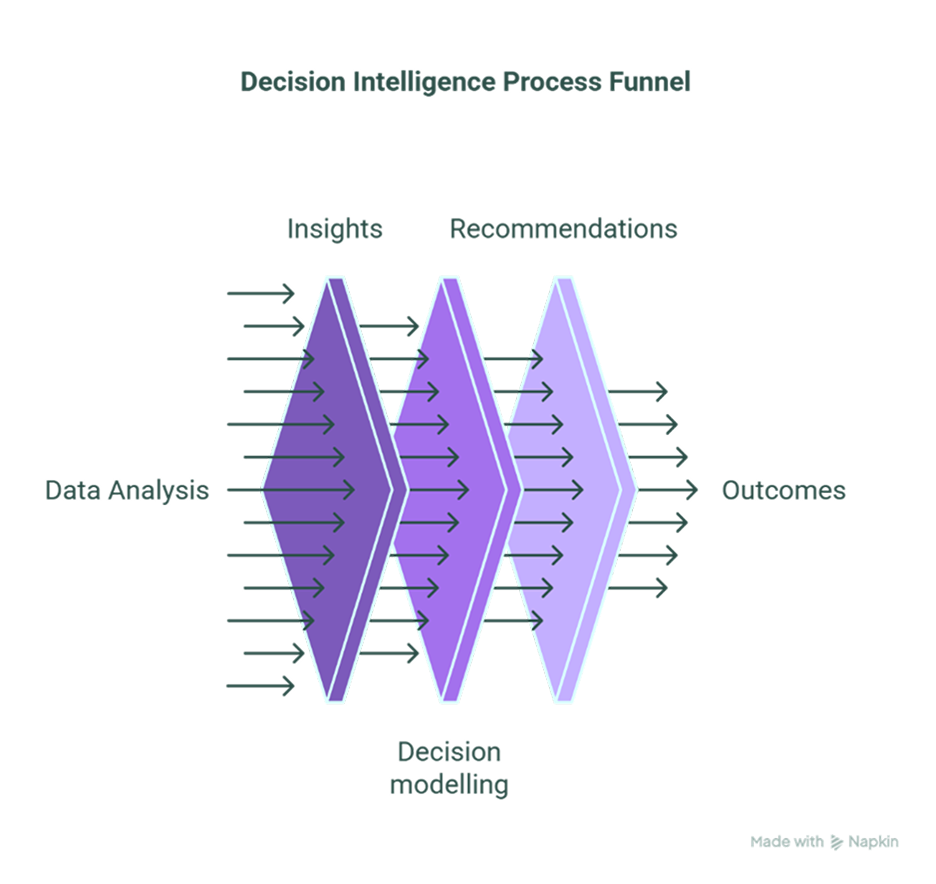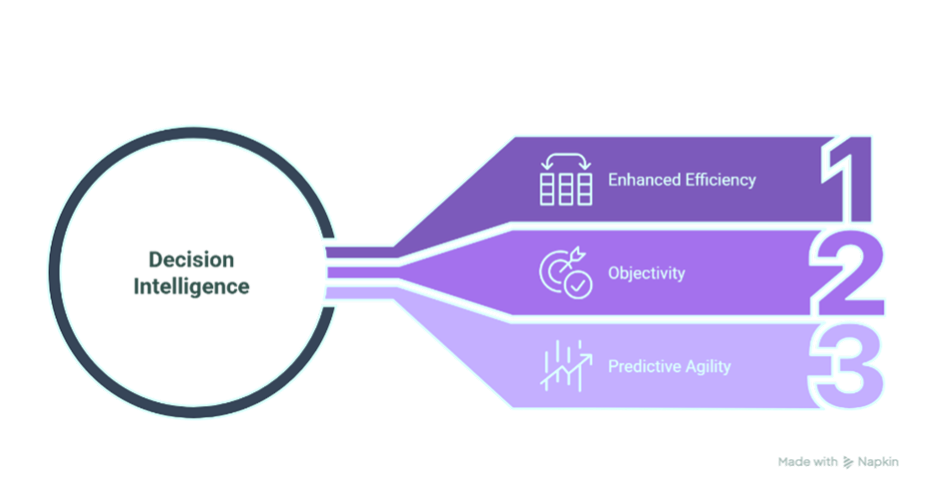Trust Your Gut?
Maybe It’s Time You Didn’t


Leaders too often pride themselves on intuition (“gut feeling”) decisions that seem almost mystical. But in today’s hyper-connected, data-saturated world, intuition alone isn’t just insufficient, it could be plain dangerous. The landscape of decision-making has shifted dramatically, demanding more than a glance backward through “traditional” Business Intelligence (BI). Forward-thinking leaders are turning instead to Decision Intelligence (DI), the invisible power reshaping how decisions get made.
Why Traditional Analytics No Longer Cut It
BI was revolutionary, two decades ago. Yet despite flashy dashboards and intricate visualizations, usage remains stubbornly low, hovering around 30%. Dashboards often dazzle rather than inform, presenting complexity instead of clarity. Front-line teams struggle to derive actionable insights from these tools, stymied by rigid interfaces and retrospective-only views. They fail to reveal what’s most critical: what’s next?
The problem is, BI looks backward. Leaders today need foresight, not hindsight. They require clarity amidst complexity, not another confusing visualization.

Decision Intelligence: Your Secret Strategic Weapon
Decision Intelligence integrates analytics, collaborative workflows, machine learning, automation and AI seamlessly into your decision-making process, delivering not just insights but actionable recommendations.
Take Spotify, for instance. It subtly understands and anticipates your taste, guiding your choices without fuss. Imagine applying that level of intuition and ease into strategic business operations: adjusting supply chains dynamically, automating pricing strategies, or personalizing customer experiences all quietly, behind the scenes. Companies using DI, like airlines optimizing baggage handling or finance automating cash flow forecasting and treasury allocation, already reap profound benefits. Invisible, powerful analytics let people focus on strategic choices rather than operational noise.
Invisible Analytics: Quietly Revolutionising Your Workflow
It’s the practice of embedding data insights and analytical processes directly into software applications and workflows, making them seamless and unobtrusive to the end-user. Instead of requiring users to actively search for data, invisible analytics automatically delivers relevant information, automates decisions, and streamlines processes in the background, offering clear guidance without overwhelming users with data intricacies. It’s the thoughtful assistant operating in the background, embedding insights directly into everyday workflows. This integration transforms analytics from burdensome to effortless.
A logistics firm that seamlessly adjusts routes based on predictive traffic data or finance department adjusting working capital positions in near real time to optimise liquidity are scenarios highlights for Decision Intelligence revolution. They free your talent to focus on strategic decisions rather than wading through mountains of data.
Strategic Benefits You Can’t Afford to Ignore
Decision Intelligence delivers:
- Enhanced Efficiency: Automates routine decisions, freeing human capital for strategic innovation.
- Objectivity: Reduces cognitive biases, grounding decisions in empirical evidence rather than subjective intuition.
- Predictive Agility: Forecasts trends, anticipates market shifts, and proactively manages risks, making your organisation resilient and responsive.

However, unlocking these benefits isn’t automatic. DI requires deliberate action, clear strategy, and thoughtful execution.
Charting Your Course to DI Success
To successfully implement Decision Intelligence, focus on three critical areas:
- Data Foundation: Ensure robust governance, prioritizing quality and a “single source of truth”. Advanced Decision Intelligence platforms, like Natzka, offer built-in data management and ingestion tools, and a unified data architecture.
- Right Tools: Choose platforms that seamlessly integrate into existing operations, support the full decision lifecycle, and scale effortlessly. Natzka’s platform exemplifies this, with intuitive interfaces, proactive automation, and cutting-edge workflow decision modelling.
- Cultural Adoption: Commit leadership resources to training, workflow integration, and incremental adoption and change management through pilot projects. Clear demonstrations of value build trust and foster a decision-driven culture.
The future belongs to those who embrace these areas. DI moves you from merely reacting to proactively shaping your organisation’s destiny. Natzka believes that true intelligence enhances human judgment, not replaces it, guiding strategic focus toward what genuinely matters. Decision Intelligence isn’t just technology; it’s clarity, agility, and insight woven seamlessly into the fabric of your business.
As “business intelligence” becomes increasingly embedded and automated, how will your organisation ensure human judgment remains focused on the strategic questions that matter most?


